Assessment 3: Impact of Preoperative Education on Patient Outcomes
VerifiedAdded on 2021/04/24
|10
|3453
|170
Report
AI Summary
This report is a literature review examining the impact of preoperative education on patient outcomes. The study begins by identifying a clinical issue and formulating a research question, focusing on the influence of preoperative education on patient outcomes. The review explores the existing literature, highlighting various methods of preoperative education such as verbal, written, and audio-visual materials, and their effects on outcomes like length of hospital stay, anxiety, and pain. The review covers studies on specific surgical procedures, such as orthopaedic and cardiac surgeries, and the effects of preoperative education on patient recovery. The report also discusses how well the existing literature addresses the research question, identifying areas for further research, including potential study designs, sample characteristics, and outcome measures, as well as ethical considerations. The implications for future research are discussed, emphasizing the need for further exploration of the topic. This assignment is available on Desklib, a platform offering a wide range of AI-based study tools.
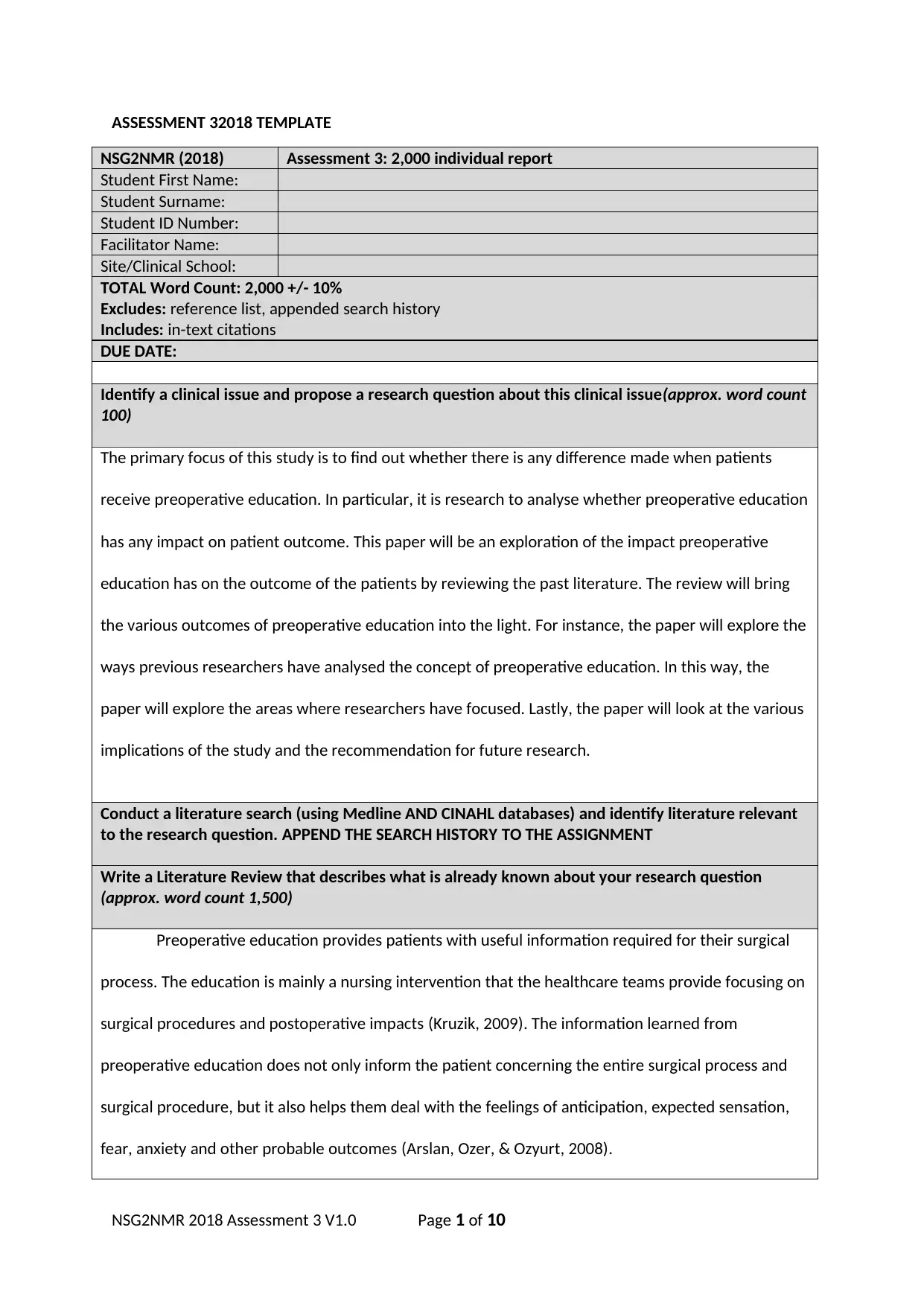
ASSESSMENT 32018 TEMPLATE
NSG2NMR (2018) Assessment 3: 2,000 individual report
Student First Name:
Student Surname:
Student ID Number:
Facilitator Name:
Site/Clinical School:
TOTAL Word Count: 2,000 +/- 10%
Excludes: reference list, appended search history
Includes: in-text citations
DUE DATE:
Identify a clinical issue and propose a research question about this clinical issue(approx. word count
100)
The primary focus of this study is to find out whether there is any difference made when patients
receive preoperative education. In particular, it is research to analyse whether preoperative education
has any impact on patient outcome. This paper will be an exploration of the impact preoperative
education has on the outcome of the patients by reviewing the past literature. The review will bring
the various outcomes of preoperative education into the light. For instance, the paper will explore the
ways previous researchers have analysed the concept of preoperative education. In this way, the
paper will explore the areas where researchers have focused. Lastly, the paper will look at the various
implications of the study and the recommendation for future research.
Conduct a literature search (using Medline AND CINAHL databases) and identify literature relevant
to the research question. APPEND THE SEARCH HISTORY TO THE ASSIGNMENT
Write a Literature Review that describes what is already known about your research question
(approx. word count 1,500)
Preoperative education provides patients with useful information required for their surgical
process. The education is mainly a nursing intervention that the healthcare teams provide focusing on
surgical procedures and postoperative impacts (Kruzik, 2009). The information learned from
preoperative education does not only inform the patient concerning the entire surgical process and
surgical procedure, but it also helps them deal with the feelings of anticipation, expected sensation,
fear, anxiety and other probable outcomes (Arslan, Ozer, & Ozyurt, 2008).
NSG2NMR 2018 Assessment 3 V1.0 Page 1 of 10
NSG2NMR (2018) Assessment 3: 2,000 individual report
Student First Name:
Student Surname:
Student ID Number:
Facilitator Name:
Site/Clinical School:
TOTAL Word Count: 2,000 +/- 10%
Excludes: reference list, appended search history
Includes: in-text citations
DUE DATE:
Identify a clinical issue and propose a research question about this clinical issue(approx. word count
100)
The primary focus of this study is to find out whether there is any difference made when patients
receive preoperative education. In particular, it is research to analyse whether preoperative education
has any impact on patient outcome. This paper will be an exploration of the impact preoperative
education has on the outcome of the patients by reviewing the past literature. The review will bring
the various outcomes of preoperative education into the light. For instance, the paper will explore the
ways previous researchers have analysed the concept of preoperative education. In this way, the
paper will explore the areas where researchers have focused. Lastly, the paper will look at the various
implications of the study and the recommendation for future research.
Conduct a literature search (using Medline AND CINAHL databases) and identify literature relevant
to the research question. APPEND THE SEARCH HISTORY TO THE ASSIGNMENT
Write a Literature Review that describes what is already known about your research question
(approx. word count 1,500)
Preoperative education provides patients with useful information required for their surgical
process. The education is mainly a nursing intervention that the healthcare teams provide focusing on
surgical procedures and postoperative impacts (Kruzik, 2009). The information learned from
preoperative education does not only inform the patient concerning the entire surgical process and
surgical procedure, but it also helps them deal with the feelings of anticipation, expected sensation,
fear, anxiety and other probable outcomes (Arslan, Ozer, & Ozyurt, 2008).
NSG2NMR 2018 Assessment 3 V1.0 Page 1 of 10
Paraphrase This Document
Need a fresh take? Get an instant paraphrase of this document with our AI Paraphraser
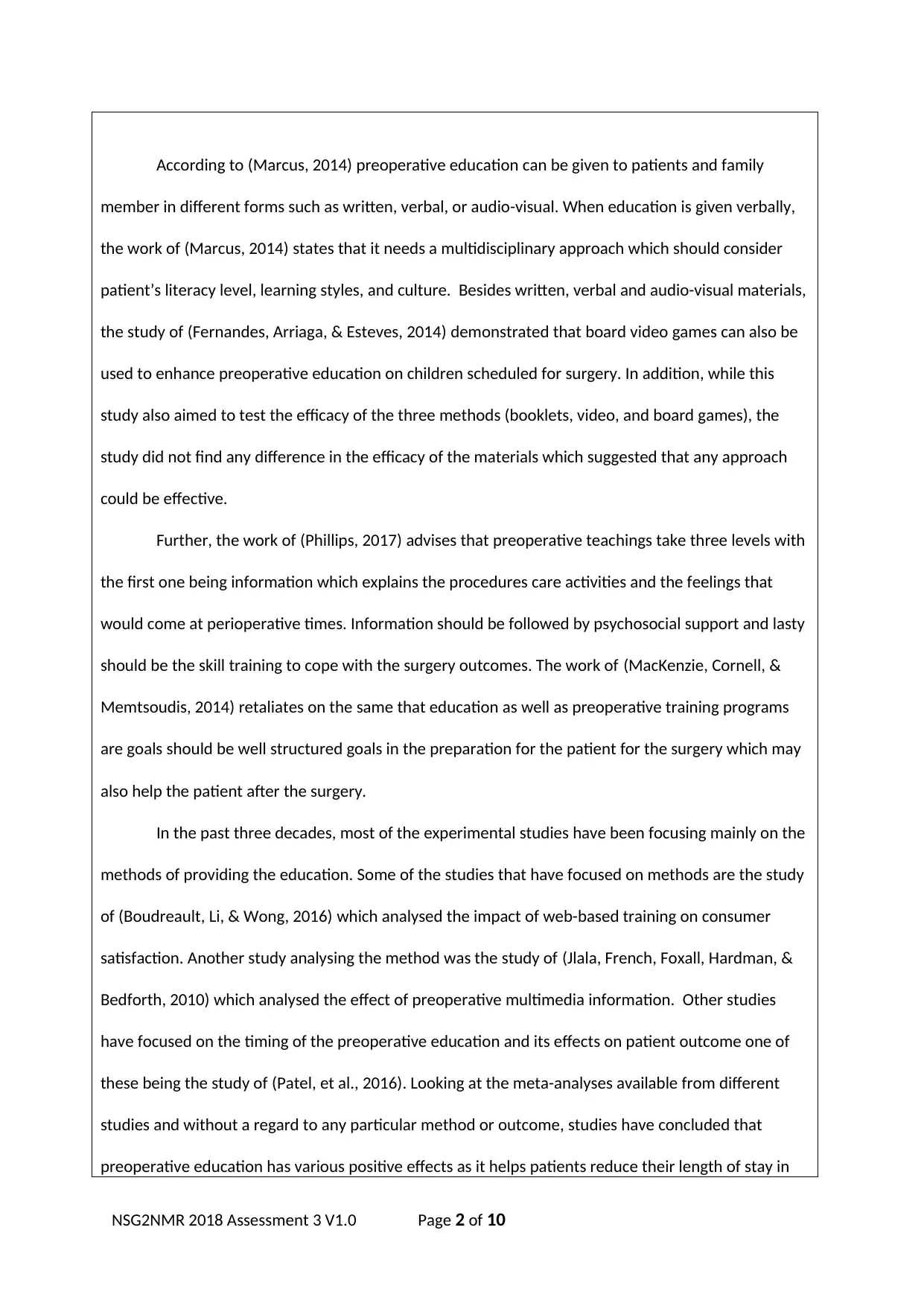
According to (Marcus, 2014) preoperative education can be given to patients and family
member in different forms such as written, verbal, or audio-visual. When education is given verbally,
the work of (Marcus, 2014) states that it needs a multidisciplinary approach which should consider
patient’s literacy level, learning styles, and culture. Besides written, verbal and audio-visual materials,
the study of (Fernandes, Arriaga, & Esteves, 2014) demonstrated that board video games can also be
used to enhance preoperative education on children scheduled for surgery. In addition, while this
study also aimed to test the efficacy of the three methods (booklets, video, and board games), the
study did not find any difference in the efficacy of the materials which suggested that any approach
could be effective.
Further, the work of (Phillips, 2017) advises that preoperative teachings take three levels with
the first one being information which explains the procedures care activities and the feelings that
would come at perioperative times. Information should be followed by psychosocial support and lasty
should be the skill training to cope with the surgery outcomes. The work of (MacKenzie, Cornell, &
Memtsoudis, 2014) retaliates on the same that education as well as preoperative training programs
are goals should be well structured goals in the preparation for the patient for the surgery which may
also help the patient after the surgery.
In the past three decades, most of the experimental studies have been focusing mainly on the
methods of providing the education. Some of the studies that have focused on methods are the study
of (Boudreault, Li, & Wong, 2016) which analysed the impact of web-based training on consumer
satisfaction. Another study analysing the method was the study of (Jlala, French, Foxall, Hardman, &
Bedforth, 2010) which analysed the effect of preoperative multimedia information. Other studies
have focused on the timing of the preoperative education and its effects on patient outcome one of
these being the study of (Patel, et al., 2016). Looking at the meta-analyses available from different
studies and without a regard to any particular method or outcome, studies have concluded that
preoperative education has various positive effects as it helps patients reduce their length of stay in
NSG2NMR 2018 Assessment 3 V1.0 Page 2 of 10
member in different forms such as written, verbal, or audio-visual. When education is given verbally,
the work of (Marcus, 2014) states that it needs a multidisciplinary approach which should consider
patient’s literacy level, learning styles, and culture. Besides written, verbal and audio-visual materials,
the study of (Fernandes, Arriaga, & Esteves, 2014) demonstrated that board video games can also be
used to enhance preoperative education on children scheduled for surgery. In addition, while this
study also aimed to test the efficacy of the three methods (booklets, video, and board games), the
study did not find any difference in the efficacy of the materials which suggested that any approach
could be effective.
Further, the work of (Phillips, 2017) advises that preoperative teachings take three levels with
the first one being information which explains the procedures care activities and the feelings that
would come at perioperative times. Information should be followed by psychosocial support and lasty
should be the skill training to cope with the surgery outcomes. The work of (MacKenzie, Cornell, &
Memtsoudis, 2014) retaliates on the same that education as well as preoperative training programs
are goals should be well structured goals in the preparation for the patient for the surgery which may
also help the patient after the surgery.
In the past three decades, most of the experimental studies have been focusing mainly on the
methods of providing the education. Some of the studies that have focused on methods are the study
of (Boudreault, Li, & Wong, 2016) which analysed the impact of web-based training on consumer
satisfaction. Another study analysing the method was the study of (Jlala, French, Foxall, Hardman, &
Bedforth, 2010) which analysed the effect of preoperative multimedia information. Other studies
have focused on the timing of the preoperative education and its effects on patient outcome one of
these being the study of (Patel, et al., 2016). Looking at the meta-analyses available from different
studies and without a regard to any particular method or outcome, studies have concluded that
preoperative education has various positive effects as it helps patients reduce their length of stay in
NSG2NMR 2018 Assessment 3 V1.0 Page 2 of 10
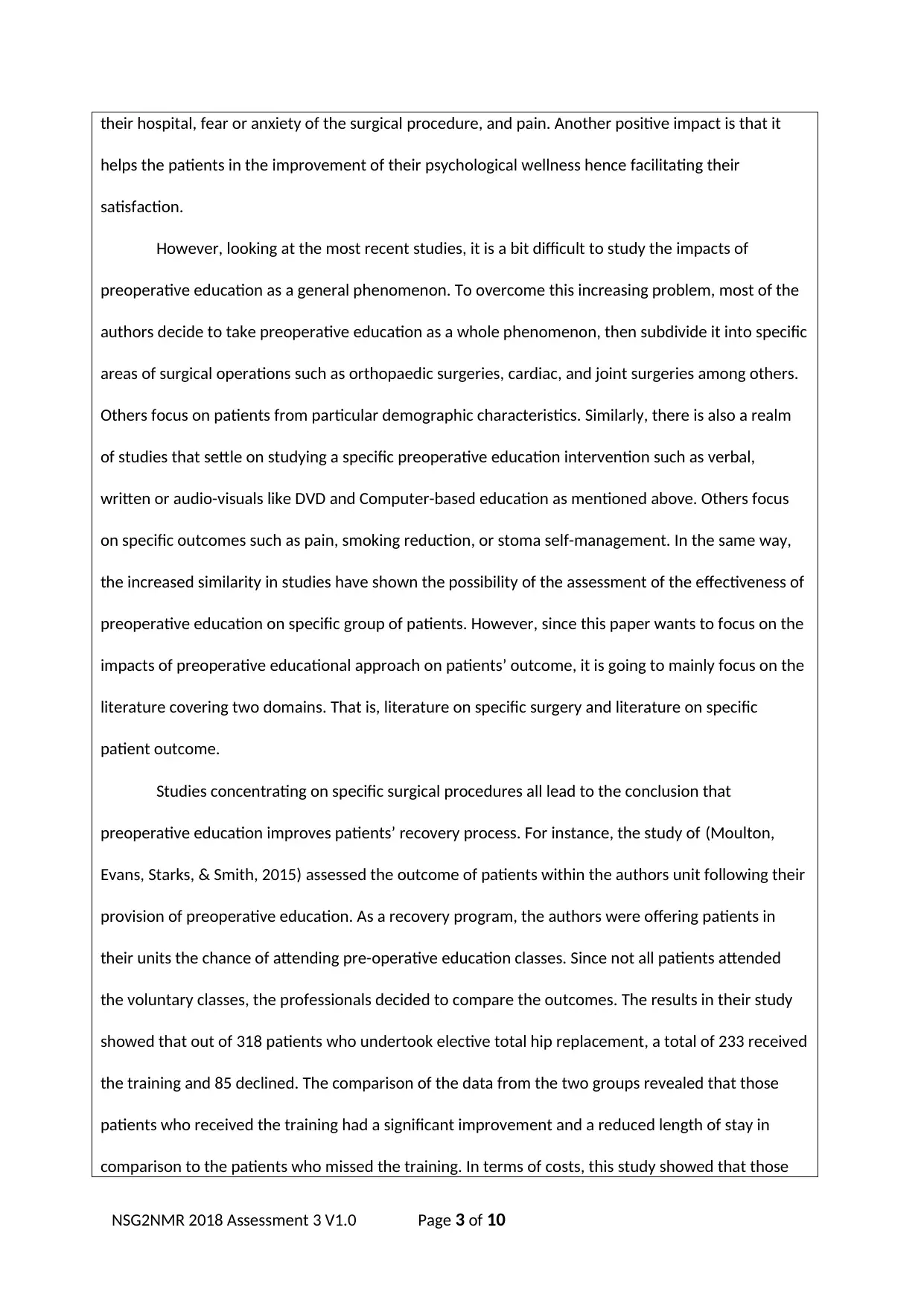
their hospital, fear or anxiety of the surgical procedure, and pain. Another positive impact is that it
helps the patients in the improvement of their psychological wellness hence facilitating their
satisfaction.
However, looking at the most recent studies, it is a bit difficult to study the impacts of
preoperative education as a general phenomenon. To overcome this increasing problem, most of the
authors decide to take preoperative education as a whole phenomenon, then subdivide it into specific
areas of surgical operations such as orthopaedic surgeries, cardiac, and joint surgeries among others.
Others focus on patients from particular demographic characteristics. Similarly, there is also a realm
of studies that settle on studying a specific preoperative education intervention such as verbal,
written or audio-visuals like DVD and Computer-based education as mentioned above. Others focus
on specific outcomes such as pain, smoking reduction, or stoma self-management. In the same way,
the increased similarity in studies have shown the possibility of the assessment of the effectiveness of
preoperative education on specific group of patients. However, since this paper wants to focus on the
impacts of preoperative educational approach on patients’ outcome, it is going to mainly focus on the
literature covering two domains. That is, literature on specific surgery and literature on specific
patient outcome.
Studies concentrating on specific surgical procedures all lead to the conclusion that
preoperative education improves patients’ recovery process. For instance, the study of (Moulton,
Evans, Starks, & Smith, 2015) assessed the outcome of patients within the authors unit following their
provision of preoperative education. As a recovery program, the authors were offering patients in
their units the chance of attending pre-operative education classes. Since not all patients attended
the voluntary classes, the professionals decided to compare the outcomes. The results in their study
showed that out of 318 patients who undertook elective total hip replacement, a total of 233 received
the training and 85 declined. The comparison of the data from the two groups revealed that those
patients who received the training had a significant improvement and a reduced length of stay in
comparison to the patients who missed the training. In terms of costs, this study showed that those
NSG2NMR 2018 Assessment 3 V1.0 Page 3 of 10
helps the patients in the improvement of their psychological wellness hence facilitating their
satisfaction.
However, looking at the most recent studies, it is a bit difficult to study the impacts of
preoperative education as a general phenomenon. To overcome this increasing problem, most of the
authors decide to take preoperative education as a whole phenomenon, then subdivide it into specific
areas of surgical operations such as orthopaedic surgeries, cardiac, and joint surgeries among others.
Others focus on patients from particular demographic characteristics. Similarly, there is also a realm
of studies that settle on studying a specific preoperative education intervention such as verbal,
written or audio-visuals like DVD and Computer-based education as mentioned above. Others focus
on specific outcomes such as pain, smoking reduction, or stoma self-management. In the same way,
the increased similarity in studies have shown the possibility of the assessment of the effectiveness of
preoperative education on specific group of patients. However, since this paper wants to focus on the
impacts of preoperative educational approach on patients’ outcome, it is going to mainly focus on the
literature covering two domains. That is, literature on specific surgery and literature on specific
patient outcome.
Studies concentrating on specific surgical procedures all lead to the conclusion that
preoperative education improves patients’ recovery process. For instance, the study of (Moulton,
Evans, Starks, & Smith, 2015) assessed the outcome of patients within the authors unit following their
provision of preoperative education. As a recovery program, the authors were offering patients in
their units the chance of attending pre-operative education classes. Since not all patients attended
the voluntary classes, the professionals decided to compare the outcomes. The results in their study
showed that out of 318 patients who undertook elective total hip replacement, a total of 233 received
the training and 85 declined. The comparison of the data from the two groups revealed that those
patients who received the training had a significant improvement and a reduced length of stay in
comparison to the patients who missed the training. In terms of costs, this study showed that those
NSG2NMR 2018 Assessment 3 V1.0 Page 3 of 10
⊘ This is a preview!⊘
Do you want full access?
Subscribe today to unlock all pages.

Trusted by 1+ million students worldwide
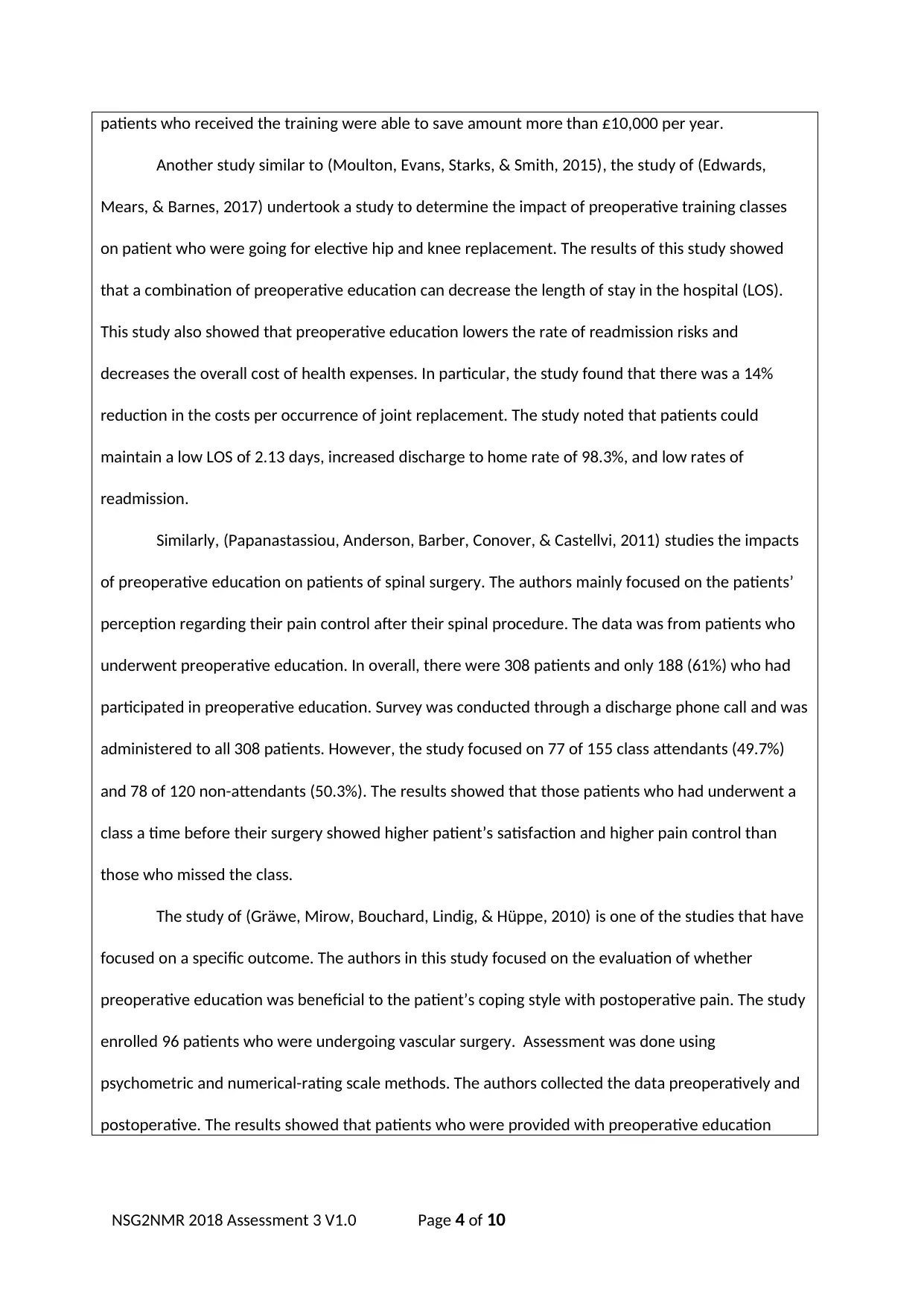
patients who received the training were able to save amount more than £10,000 per year.
Another study similar to (Moulton, Evans, Starks, & Smith, 2015), the study of (Edwards,
Mears, & Barnes, 2017) undertook a study to determine the impact of preoperative training classes
on patient who were going for elective hip and knee replacement. The results of this study showed
that a combination of preoperative education can decrease the length of stay in the hospital (LOS).
This study also showed that preoperative education lowers the rate of readmission risks and
decreases the overall cost of health expenses. In particular, the study found that there was a 14%
reduction in the costs per occurrence of joint replacement. The study noted that patients could
maintain a low LOS of 2.13 days, increased discharge to home rate of 98.3%, and low rates of
readmission.
Similarly, (Papanastassiou, Anderson, Barber, Conover, & Castellvi, 2011) studies the impacts
of preoperative education on patients of spinal surgery. The authors mainly focused on the patients’
perception regarding their pain control after their spinal procedure. The data was from patients who
underwent preoperative education. In overall, there were 308 patients and only 188 (61%) who had
participated in preoperative education. Survey was conducted through a discharge phone call and was
administered to all 308 patients. However, the study focused on 77 of 155 class attendants (49.7%)
and 78 of 120 non-attendants (50.3%). The results showed that those patients who had underwent a
class a time before their surgery showed higher patient’s satisfaction and higher pain control than
those who missed the class.
The study of (Gräwe, Mirow, Bouchard, Lindig, & Hüppe, 2010) is one of the studies that have
focused on a specific outcome. The authors in this study focused on the evaluation of whether
preoperative education was beneficial to the patient’s coping style with postoperative pain. The study
enrolled 96 patients who were undergoing vascular surgery. Assessment was done using
psychometric and numerical-rating scale methods. The authors collected the data preoperatively and
postoperative. The results showed that patients who were provided with preoperative education
NSG2NMR 2018 Assessment 3 V1.0 Page 4 of 10
Another study similar to (Moulton, Evans, Starks, & Smith, 2015), the study of (Edwards,
Mears, & Barnes, 2017) undertook a study to determine the impact of preoperative training classes
on patient who were going for elective hip and knee replacement. The results of this study showed
that a combination of preoperative education can decrease the length of stay in the hospital (LOS).
This study also showed that preoperative education lowers the rate of readmission risks and
decreases the overall cost of health expenses. In particular, the study found that there was a 14%
reduction in the costs per occurrence of joint replacement. The study noted that patients could
maintain a low LOS of 2.13 days, increased discharge to home rate of 98.3%, and low rates of
readmission.
Similarly, (Papanastassiou, Anderson, Barber, Conover, & Castellvi, 2011) studies the impacts
of preoperative education on patients of spinal surgery. The authors mainly focused on the patients’
perception regarding their pain control after their spinal procedure. The data was from patients who
underwent preoperative education. In overall, there were 308 patients and only 188 (61%) who had
participated in preoperative education. Survey was conducted through a discharge phone call and was
administered to all 308 patients. However, the study focused on 77 of 155 class attendants (49.7%)
and 78 of 120 non-attendants (50.3%). The results showed that those patients who had underwent a
class a time before their surgery showed higher patient’s satisfaction and higher pain control than
those who missed the class.
The study of (Gräwe, Mirow, Bouchard, Lindig, & Hüppe, 2010) is one of the studies that have
focused on a specific outcome. The authors in this study focused on the evaluation of whether
preoperative education was beneficial to the patient’s coping style with postoperative pain. The study
enrolled 96 patients who were undergoing vascular surgery. Assessment was done using
psychometric and numerical-rating scale methods. The authors collected the data preoperatively and
postoperative. The results showed that patients who were provided with preoperative education
NSG2NMR 2018 Assessment 3 V1.0 Page 4 of 10
Paraphrase This Document
Need a fresh take? Get an instant paraphrase of this document with our AI Paraphraser
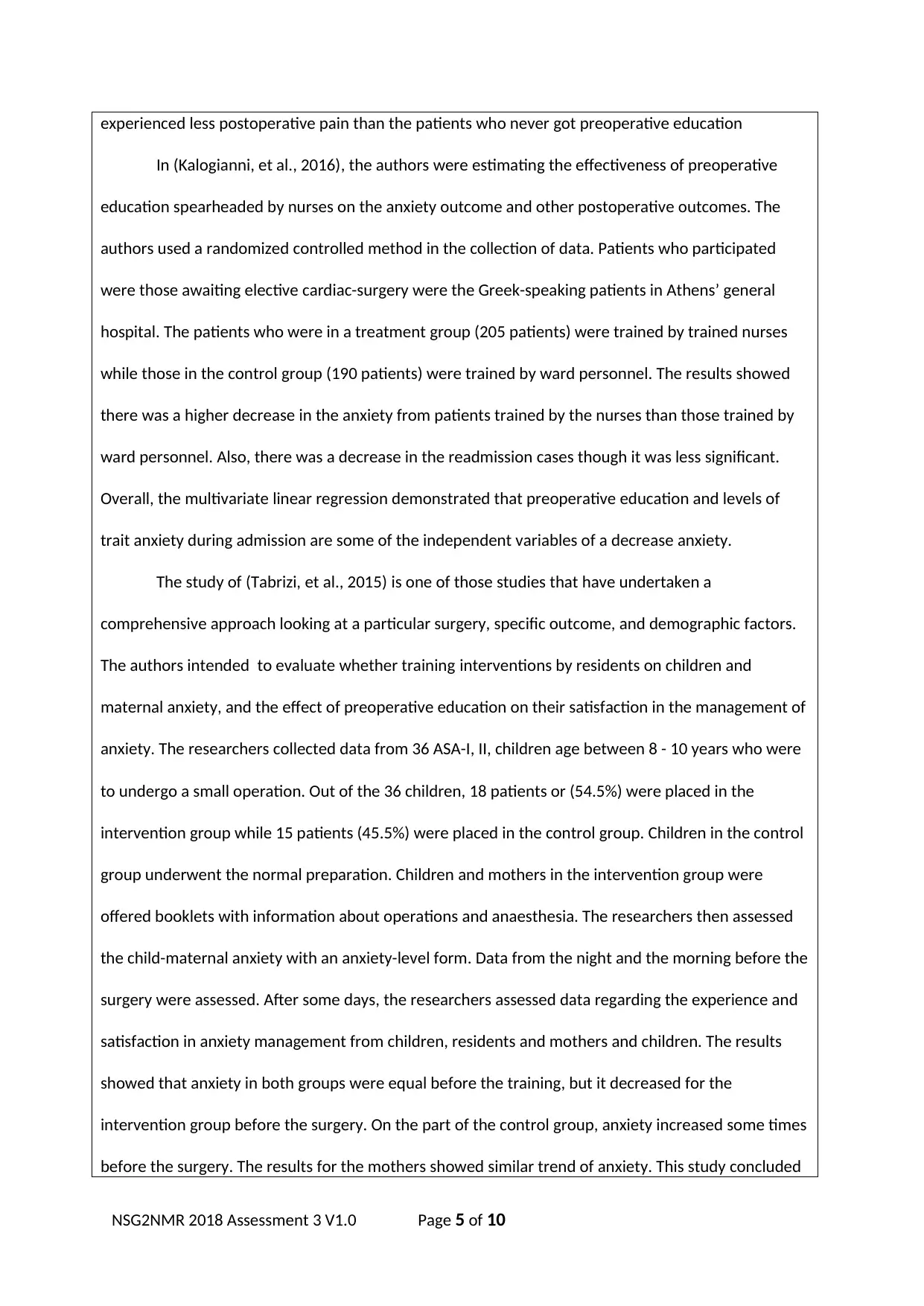
experienced less postoperative pain than the patients who never got preoperative education
In (Kalogianni, et al., 2016), the authors were estimating the effectiveness of preoperative
education spearheaded by nurses on the anxiety outcome and other postoperative outcomes. The
authors used a randomized controlled method in the collection of data. Patients who participated
were those awaiting elective cardiac-surgery were the Greek-speaking patients in Athens’ general
hospital. The patients who were in a treatment group (205 patients) were trained by trained nurses
while those in the control group (190 patients) were trained by ward personnel. The results showed
there was a higher decrease in the anxiety from patients trained by the nurses than those trained by
ward personnel. Also, there was a decrease in the readmission cases though it was less significant.
Overall, the multivariate linear regression demonstrated that preoperative education and levels of
trait anxiety during admission are some of the independent variables of a decrease anxiety.
The study of (Tabrizi, et al., 2015) is one of those studies that have undertaken a
comprehensive approach looking at a particular surgery, specific outcome, and demographic factors.
The authors intended to evaluate whether training interventions by residents on children and
maternal anxiety, and the effect of preoperative education on their satisfaction in the management of
anxiety. The researchers collected data from 36 ASA-I, II, children age between 8 - 10 years who were
to undergo a small operation. Out of the 36 children, 18 patients or (54.5%) were placed in the
intervention group while 15 patients (45.5%) were placed in the control group. Children in the control
group underwent the normal preparation. Children and mothers in the intervention group were
offered booklets with information about operations and anaesthesia. The researchers then assessed
the child-maternal anxiety with an anxiety-level form. Data from the night and the morning before the
surgery were assessed. After some days, the researchers assessed data regarding the experience and
satisfaction in anxiety management from children, residents and mothers and children. The results
showed that anxiety in both groups were equal before the training, but it decreased for the
intervention group before the surgery. On the part of the control group, anxiety increased some times
before the surgery. The results for the mothers showed similar trend of anxiety. This study concluded
NSG2NMR 2018 Assessment 3 V1.0 Page 5 of 10
In (Kalogianni, et al., 2016), the authors were estimating the effectiveness of preoperative
education spearheaded by nurses on the anxiety outcome and other postoperative outcomes. The
authors used a randomized controlled method in the collection of data. Patients who participated
were those awaiting elective cardiac-surgery were the Greek-speaking patients in Athens’ general
hospital. The patients who were in a treatment group (205 patients) were trained by trained nurses
while those in the control group (190 patients) were trained by ward personnel. The results showed
there was a higher decrease in the anxiety from patients trained by the nurses than those trained by
ward personnel. Also, there was a decrease in the readmission cases though it was less significant.
Overall, the multivariate linear regression demonstrated that preoperative education and levels of
trait anxiety during admission are some of the independent variables of a decrease anxiety.
The study of (Tabrizi, et al., 2015) is one of those studies that have undertaken a
comprehensive approach looking at a particular surgery, specific outcome, and demographic factors.
The authors intended to evaluate whether training interventions by residents on children and
maternal anxiety, and the effect of preoperative education on their satisfaction in the management of
anxiety. The researchers collected data from 36 ASA-I, II, children age between 8 - 10 years who were
to undergo a small operation. Out of the 36 children, 18 patients or (54.5%) were placed in the
intervention group while 15 patients (45.5%) were placed in the control group. Children in the control
group underwent the normal preparation. Children and mothers in the intervention group were
offered booklets with information about operations and anaesthesia. The researchers then assessed
the child-maternal anxiety with an anxiety-level form. Data from the night and the morning before the
surgery were assessed. After some days, the researchers assessed data regarding the experience and
satisfaction in anxiety management from children, residents and mothers and children. The results
showed that anxiety in both groups were equal before the training, but it decreased for the
intervention group before the surgery. On the part of the control group, anxiety increased some times
before the surgery. The results for the mothers showed similar trend of anxiety. This study concluded
NSG2NMR 2018 Assessment 3 V1.0 Page 5 of 10
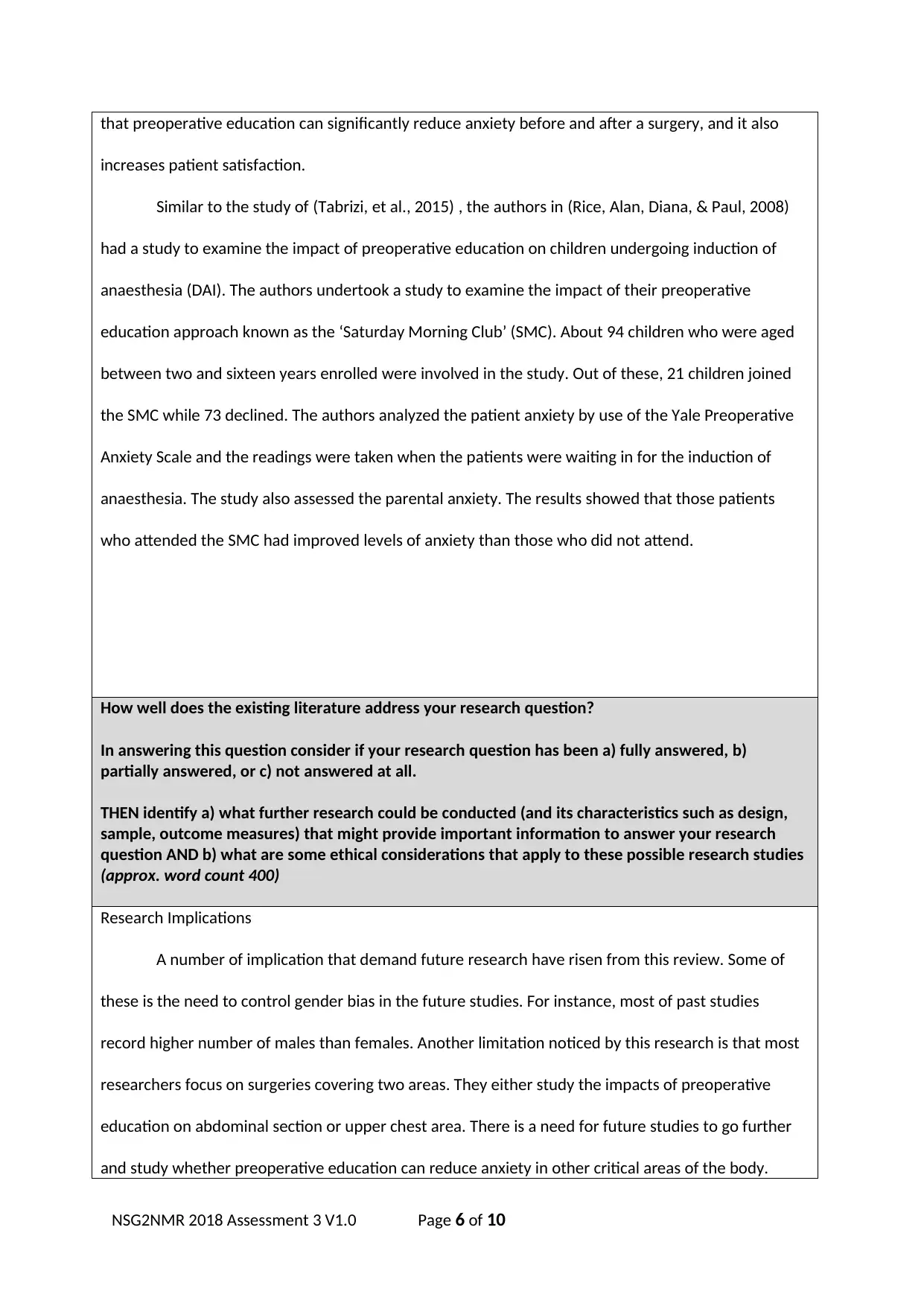
that preoperative education can significantly reduce anxiety before and after a surgery, and it also
increases patient satisfaction.
Similar to the study of (Tabrizi, et al., 2015) , the authors in (Rice, Alan, Diana, & Paul, 2008)
had a study to examine the impact of preoperative education on children undergoing induction of
anaesthesia (DAI). The authors undertook a study to examine the impact of their preoperative
education approach known as the ‘Saturday Morning Club’ (SMC). About 94 children who were aged
between two and sixteen years enrolled were involved in the study. Out of these, 21 children joined
the SMC while 73 declined. The authors analyzed the patient anxiety by use of the Yale Preoperative
Anxiety Scale and the readings were taken when the patients were waiting in for the induction of
anaesthesia. The study also assessed the parental anxiety. The results showed that those patients
who attended the SMC had improved levels of anxiety than those who did not attend.
How well does the existing literature address your research question?
In answering this question consider if your research question has been a) fully answered, b)
partially answered, or c) not answered at all.
THEN identify a) what further research could be conducted (and its characteristics such as design,
sample, outcome measures) that might provide important information to answer your research
question AND b) what are some ethical considerations that apply to these possible research studies
(approx. word count 400)
Research Implications
A number of implication that demand future research have risen from this review. Some of
these is the need to control gender bias in the future studies. For instance, most of past studies
record higher number of males than females. Another limitation noticed by this research is that most
researchers focus on surgeries covering two areas. They either study the impacts of preoperative
education on abdominal section or upper chest area. There is a need for future studies to go further
and study whether preoperative education can reduce anxiety in other critical areas of the body.
NSG2NMR 2018 Assessment 3 V1.0 Page 6 of 10
increases patient satisfaction.
Similar to the study of (Tabrizi, et al., 2015) , the authors in (Rice, Alan, Diana, & Paul, 2008)
had a study to examine the impact of preoperative education on children undergoing induction of
anaesthesia (DAI). The authors undertook a study to examine the impact of their preoperative
education approach known as the ‘Saturday Morning Club’ (SMC). About 94 children who were aged
between two and sixteen years enrolled were involved in the study. Out of these, 21 children joined
the SMC while 73 declined. The authors analyzed the patient anxiety by use of the Yale Preoperative
Anxiety Scale and the readings were taken when the patients were waiting in for the induction of
anaesthesia. The study also assessed the parental anxiety. The results showed that those patients
who attended the SMC had improved levels of anxiety than those who did not attend.
How well does the existing literature address your research question?
In answering this question consider if your research question has been a) fully answered, b)
partially answered, or c) not answered at all.
THEN identify a) what further research could be conducted (and its characteristics such as design,
sample, outcome measures) that might provide important information to answer your research
question AND b) what are some ethical considerations that apply to these possible research studies
(approx. word count 400)
Research Implications
A number of implication that demand future research have risen from this review. Some of
these is the need to control gender bias in the future studies. For instance, most of past studies
record higher number of males than females. Another limitation noticed by this research is that most
researchers focus on surgeries covering two areas. They either study the impacts of preoperative
education on abdominal section or upper chest area. There is a need for future studies to go further
and study whether preoperative education can reduce anxiety in other critical areas of the body.
NSG2NMR 2018 Assessment 3 V1.0 Page 6 of 10
⊘ This is a preview!⊘
Do you want full access?
Subscribe today to unlock all pages.

Trusted by 1+ million students worldwide
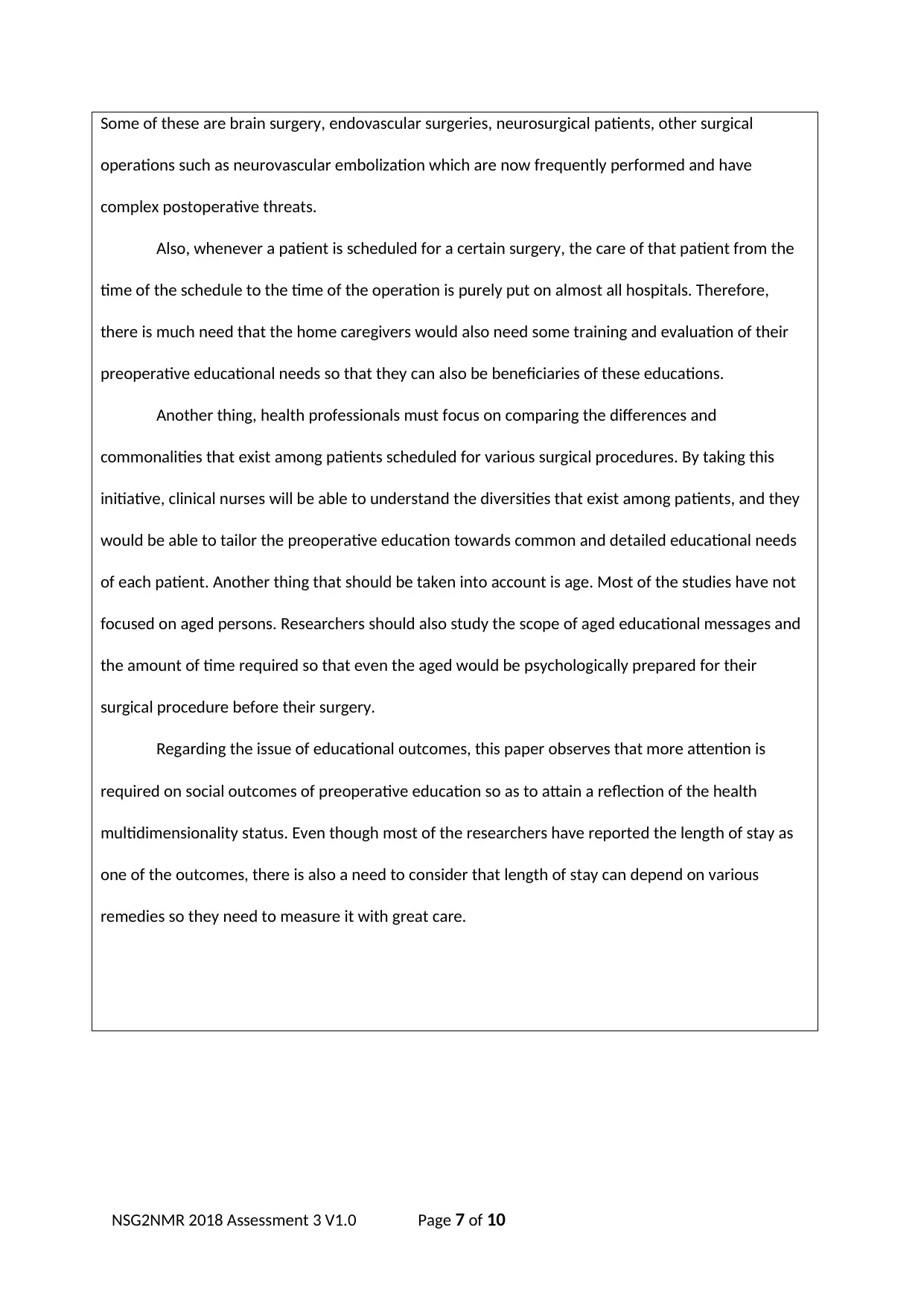
Some of these are brain surgery, endovascular surgeries, neurosurgical patients, other surgical
operations such as neurovascular embolization which are now frequently performed and have
complex postoperative threats.
Also, whenever a patient is scheduled for a certain surgery, the care of that patient from the
time of the schedule to the time of the operation is purely put on almost all hospitals. Therefore,
there is much need that the home caregivers would also need some training and evaluation of their
preoperative educational needs so that they can also be beneficiaries of these educations.
Another thing, health professionals must focus on comparing the differences and
commonalities that exist among patients scheduled for various surgical procedures. By taking this
initiative, clinical nurses will be able to understand the diversities that exist among patients, and they
would be able to tailor the preoperative education towards common and detailed educational needs
of each patient. Another thing that should be taken into account is age. Most of the studies have not
focused on aged persons. Researchers should also study the scope of aged educational messages and
the amount of time required so that even the aged would be psychologically prepared for their
surgical procedure before their surgery.
Regarding the issue of educational outcomes, this paper observes that more attention is
required on social outcomes of preoperative education so as to attain a reflection of the health
multidimensionality status. Even though most of the researchers have reported the length of stay as
one of the outcomes, there is also a need to consider that length of stay can depend on various
remedies so they need to measure it with great care.
NSG2NMR 2018 Assessment 3 V1.0 Page 7 of 10
operations such as neurovascular embolization which are now frequently performed and have
complex postoperative threats.
Also, whenever a patient is scheduled for a certain surgery, the care of that patient from the
time of the schedule to the time of the operation is purely put on almost all hospitals. Therefore,
there is much need that the home caregivers would also need some training and evaluation of their
preoperative educational needs so that they can also be beneficiaries of these educations.
Another thing, health professionals must focus on comparing the differences and
commonalities that exist among patients scheduled for various surgical procedures. By taking this
initiative, clinical nurses will be able to understand the diversities that exist among patients, and they
would be able to tailor the preoperative education towards common and detailed educational needs
of each patient. Another thing that should be taken into account is age. Most of the studies have not
focused on aged persons. Researchers should also study the scope of aged educational messages and
the amount of time required so that even the aged would be psychologically prepared for their
surgical procedure before their surgery.
Regarding the issue of educational outcomes, this paper observes that more attention is
required on social outcomes of preoperative education so as to attain a reflection of the health
multidimensionality status. Even though most of the researchers have reported the length of stay as
one of the outcomes, there is also a need to consider that length of stay can depend on various
remedies so they need to measure it with great care.
NSG2NMR 2018 Assessment 3 V1.0 Page 7 of 10
Paraphrase This Document
Need a fresh take? Get an instant paraphrase of this document with our AI Paraphraser
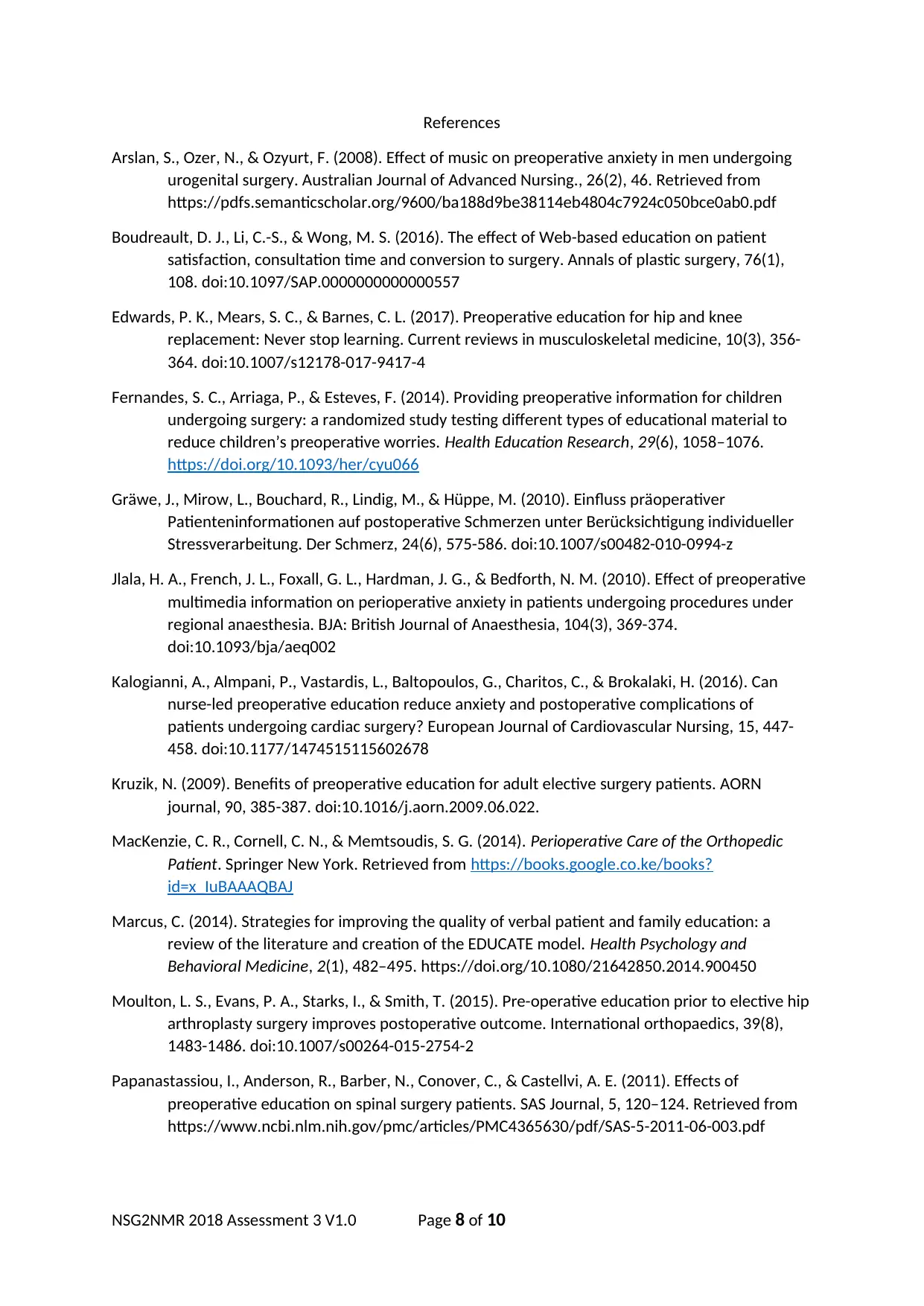
References
Arslan, S., Ozer, N., & Ozyurt, F. (2008). Effect of music on preoperative anxiety in men undergoing
urogenital surgery. Australian Journal of Advanced Nursing., 26(2), 46. Retrieved from
https://pdfs.semanticscholar.org/9600/ba188d9be38114eb4804c7924c050bce0ab0.pdf
Boudreault, D. J., Li, C.-S., & Wong, M. S. (2016). The effect of Web-based education on patient
satisfaction, consultation time and conversion to surgery. Annals of plastic surgery, 76(1),
108. doi:10.1097/SAP.0000000000000557
Edwards, P. K., Mears, S. C., & Barnes, C. L. (2017). Preoperative education for hip and knee
replacement: Never stop learning. Current reviews in musculoskeletal medicine, 10(3), 356-
364. doi:10.1007/s12178-017-9417-4
Fernandes, S. C., Arriaga, P., & Esteves, F. (2014). Providing preoperative information for children
undergoing surgery: a randomized study testing different types of educational material to
reduce children’s preoperative worries. Health Education Research, 29(6), 1058–1076.
https://doi.org/10.1093/her/cyu066
Gräwe, J., Mirow, L., Bouchard, R., Lindig, M., & Hüppe, M. (2010). Einfluss präoperativer
Patienteninformationen auf postoperative Schmerzen unter Berücksichtigung individueller
Stressverarbeitung. Der Schmerz, 24(6), 575-586. doi:10.1007/s00482-010-0994-z
Jlala, H. A., French, J. L., Foxall, G. L., Hardman, J. G., & Bedforth, N. M. (2010). Effect of preoperative
multimedia information on perioperative anxiety in patients undergoing procedures under
regional anaesthesia. BJA: British Journal of Anaesthesia, 104(3), 369-374.
doi:10.1093/bja/aeq002
Kalogianni, A., Almpani, P., Vastardis, L., Baltopoulos, G., Charitos, C., & Brokalaki, H. (2016). Can
nurse-led preoperative education reduce anxiety and postoperative complications of
patients undergoing cardiac surgery? European Journal of Cardiovascular Nursing, 15, 447-
458. doi:10.1177/1474515115602678
Kruzik, N. (2009). Benefits of preoperative education for adult elective surgery patients. AORN
journal, 90, 385-387. doi:10.1016/j.aorn.2009.06.022.
MacKenzie, C. R., Cornell, C. N., & Memtsoudis, S. G. (2014). Perioperative Care of the Orthopedic
Patient. Springer New York. Retrieved from https://books.google.co.ke/books?
id=x_IuBAAAQBAJ
Marcus, C. (2014). Strategies for improving the quality of verbal patient and family education: a
review of the literature and creation of the EDUCATE model. Health Psychology and
Behavioral Medicine, 2(1), 482–495. https://doi.org/10.1080/21642850.2014.900450
Moulton, L. S., Evans, P. A., Starks, I., & Smith, T. (2015). Pre-operative education prior to elective hip
arthroplasty surgery improves postoperative outcome. International orthopaedics, 39(8),
1483-1486. doi:10.1007/s00264-015-2754-2
Papanastassiou, I., Anderson, R., Barber, N., Conover, C., & Castellvi, A. E. (2011). Effects of
preoperative education on spinal surgery patients. SAS Journal, 5, 120–124. Retrieved from
https://www.ncbi.nlm.nih.gov/pmc/articles/PMC4365630/pdf/SAS-5-2011-06-003.pdf
NSG2NMR 2018 Assessment 3 V1.0 Page 8 of 10
Arslan, S., Ozer, N., & Ozyurt, F. (2008). Effect of music on preoperative anxiety in men undergoing
urogenital surgery. Australian Journal of Advanced Nursing., 26(2), 46. Retrieved from
https://pdfs.semanticscholar.org/9600/ba188d9be38114eb4804c7924c050bce0ab0.pdf
Boudreault, D. J., Li, C.-S., & Wong, M. S. (2016). The effect of Web-based education on patient
satisfaction, consultation time and conversion to surgery. Annals of plastic surgery, 76(1),
108. doi:10.1097/SAP.0000000000000557
Edwards, P. K., Mears, S. C., & Barnes, C. L. (2017). Preoperative education for hip and knee
replacement: Never stop learning. Current reviews in musculoskeletal medicine, 10(3), 356-
364. doi:10.1007/s12178-017-9417-4
Fernandes, S. C., Arriaga, P., & Esteves, F. (2014). Providing preoperative information for children
undergoing surgery: a randomized study testing different types of educational material to
reduce children’s preoperative worries. Health Education Research, 29(6), 1058–1076.
https://doi.org/10.1093/her/cyu066
Gräwe, J., Mirow, L., Bouchard, R., Lindig, M., & Hüppe, M. (2010). Einfluss präoperativer
Patienteninformationen auf postoperative Schmerzen unter Berücksichtigung individueller
Stressverarbeitung. Der Schmerz, 24(6), 575-586. doi:10.1007/s00482-010-0994-z
Jlala, H. A., French, J. L., Foxall, G. L., Hardman, J. G., & Bedforth, N. M. (2010). Effect of preoperative
multimedia information on perioperative anxiety in patients undergoing procedures under
regional anaesthesia. BJA: British Journal of Anaesthesia, 104(3), 369-374.
doi:10.1093/bja/aeq002
Kalogianni, A., Almpani, P., Vastardis, L., Baltopoulos, G., Charitos, C., & Brokalaki, H. (2016). Can
nurse-led preoperative education reduce anxiety and postoperative complications of
patients undergoing cardiac surgery? European Journal of Cardiovascular Nursing, 15, 447-
458. doi:10.1177/1474515115602678
Kruzik, N. (2009). Benefits of preoperative education for adult elective surgery patients. AORN
journal, 90, 385-387. doi:10.1016/j.aorn.2009.06.022.
MacKenzie, C. R., Cornell, C. N., & Memtsoudis, S. G. (2014). Perioperative Care of the Orthopedic
Patient. Springer New York. Retrieved from https://books.google.co.ke/books?
id=x_IuBAAAQBAJ
Marcus, C. (2014). Strategies for improving the quality of verbal patient and family education: a
review of the literature and creation of the EDUCATE model. Health Psychology and
Behavioral Medicine, 2(1), 482–495. https://doi.org/10.1080/21642850.2014.900450
Moulton, L. S., Evans, P. A., Starks, I., & Smith, T. (2015). Pre-operative education prior to elective hip
arthroplasty surgery improves postoperative outcome. International orthopaedics, 39(8),
1483-1486. doi:10.1007/s00264-015-2754-2
Papanastassiou, I., Anderson, R., Barber, N., Conover, C., & Castellvi, A. E. (2011). Effects of
preoperative education on spinal surgery patients. SAS Journal, 5, 120–124. Retrieved from
https://www.ncbi.nlm.nih.gov/pmc/articles/PMC4365630/pdf/SAS-5-2011-06-003.pdf
NSG2NMR 2018 Assessment 3 V1.0 Page 8 of 10
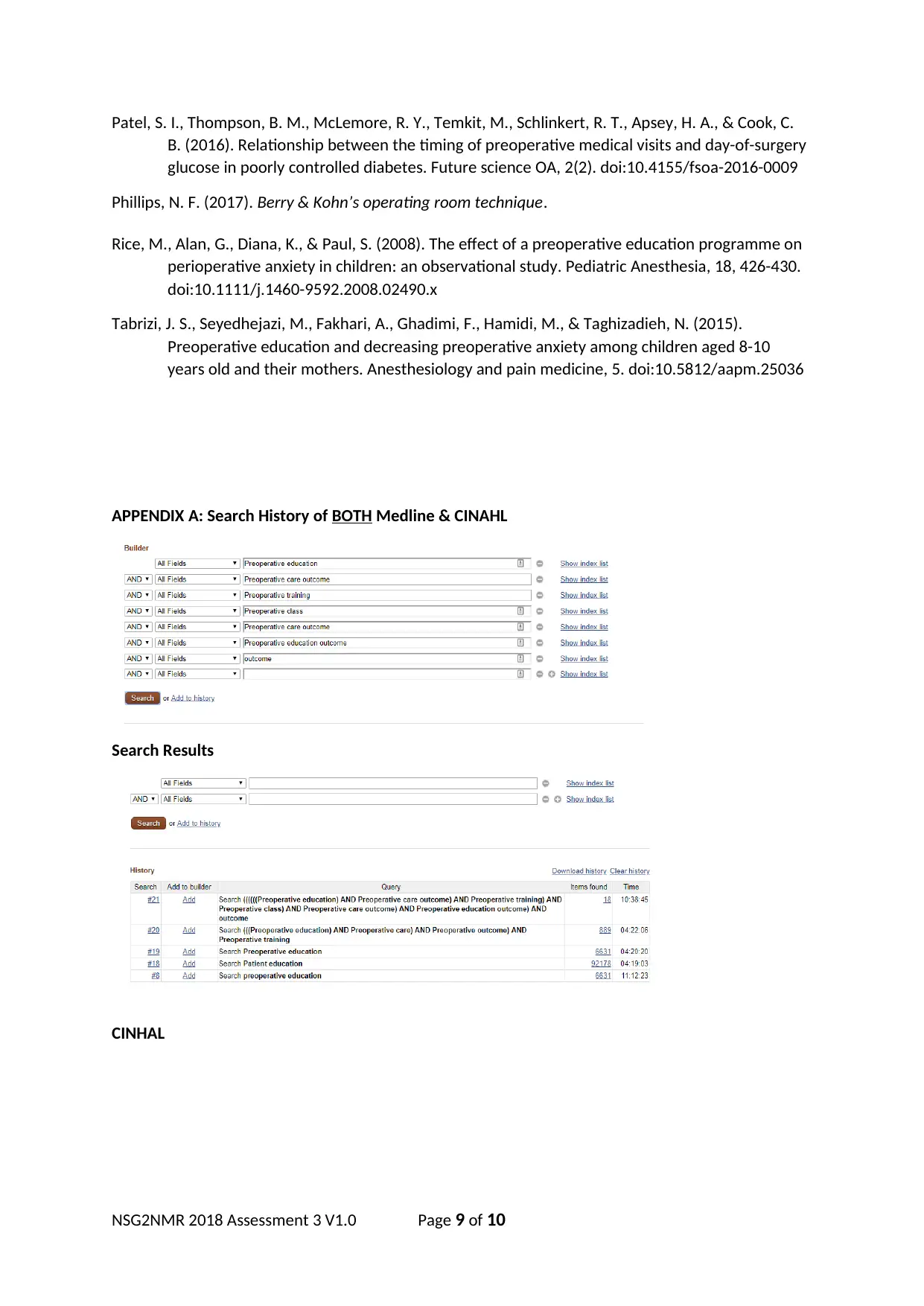
Patel, S. I., Thompson, B. M., McLemore, R. Y., Temkit, M., Schlinkert, R. T., Apsey, H. A., & Cook, C.
B. (2016). Relationship between the timing of preoperative medical visits and day-of-surgery
glucose in poorly controlled diabetes. Future science OA, 2(2). doi:10.4155/fsoa-2016-0009
Phillips, N. F. (2017). Berry & Kohn’s operating room technique.
Rice, M., Alan, G., Diana, K., & Paul, S. (2008). The effect of a preoperative education programme on
perioperative anxiety in children: an observational study. Pediatric Anesthesia, 18, 426-430.
doi:10.1111/j.1460-9592.2008.02490.x
Tabrizi, J. S., Seyedhejazi, M., Fakhari, A., Ghadimi, F., Hamidi, M., & Taghizadieh, N. (2015).
Preoperative education and decreasing preoperative anxiety among children aged 8-10
years old and their mothers. Anesthesiology and pain medicine, 5. doi:10.5812/aapm.25036
APPENDIX A: Search History of BOTH Medline & CINAHL
Search Results
CINHAL
NSG2NMR 2018 Assessment 3 V1.0 Page 9 of 10
B. (2016). Relationship between the timing of preoperative medical visits and day-of-surgery
glucose in poorly controlled diabetes. Future science OA, 2(2). doi:10.4155/fsoa-2016-0009
Phillips, N. F. (2017). Berry & Kohn’s operating room technique.
Rice, M., Alan, G., Diana, K., & Paul, S. (2008). The effect of a preoperative education programme on
perioperative anxiety in children: an observational study. Pediatric Anesthesia, 18, 426-430.
doi:10.1111/j.1460-9592.2008.02490.x
Tabrizi, J. S., Seyedhejazi, M., Fakhari, A., Ghadimi, F., Hamidi, M., & Taghizadieh, N. (2015).
Preoperative education and decreasing preoperative anxiety among children aged 8-10
years old and their mothers. Anesthesiology and pain medicine, 5. doi:10.5812/aapm.25036
APPENDIX A: Search History of BOTH Medline & CINAHL
Search Results
CINHAL
NSG2NMR 2018 Assessment 3 V1.0 Page 9 of 10
⊘ This is a preview!⊘
Do you want full access?
Subscribe today to unlock all pages.

Trusted by 1+ million students worldwide
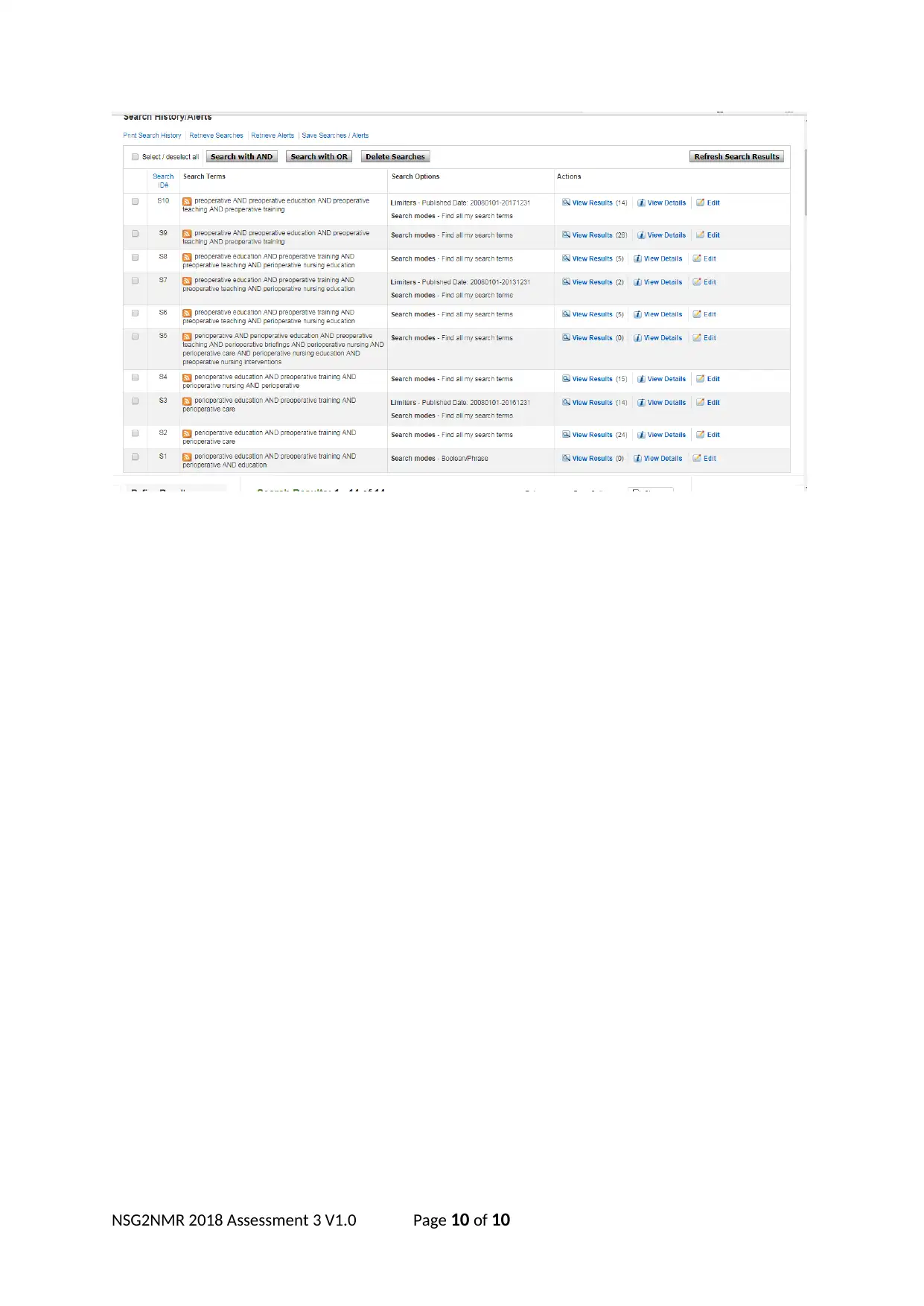
NSG2NMR 2018 Assessment 3 V1.0 Page 10 of 10
1 out of 10
Related Documents
Your All-in-One AI-Powered Toolkit for Academic Success.
+13062052269
info@desklib.com
Available 24*7 on WhatsApp / Email
![[object Object]](/_next/static/media/star-bottom.7253800d.svg)
Unlock your academic potential
Copyright © 2020–2026 A2Z Services. All Rights Reserved. Developed and managed by ZUCOL.





